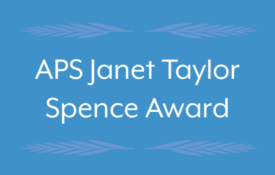-
It’s Time for Police to Stop Lying to Suspects
Author/APS Member: Saul Kassin Most Americans don’t know this, but police officers in the United States are permitted by law to outright lie about evidence to suspects they interrogate in pursuit of a confession. Of all forms of subterfuge they deploy — like feigning sympathy and suggesting that a suspect’s confession might bring leniency — this one is particularly dangerous. In Frazier v. Cupp (1969), the Supreme Court made it lawful for the police to present false evidence. “The victim’s blood was found on your pillow,” “You failed the polygraph,” “Your fingerprints were on the knife” and “Your friend said she wasn’t with you like you said” are some common but brazen lies told.
-

Training to Wisely Navigate Social Conflicts
People are able to approach social conflicts more wisely if they have trained themselves in advance by practicing a distanced self-talk technique.
-

Training to Wisely Navigate Social Conflicts
People are able to approach social conflicts more wisely if they have trained themselves in advance by practicing a distanced self-talk technique, referring to themselves with third-person pronouns such as “she” or “they” rather than the first-person pronouns of “me” or “I.”
-

Seven Psychological Scientists Receive 2021 APS Janet Taylor Spence Award for Transformative Early-Career Contributions
Seven psychological scientists have been selected as the recipients of the 2021 APS Janet Taylor Spence Award.
-
How Poverty Makes Workers Less Productive
As Washington debates sending checks to Americans and increasing the minimum wage, a new study offers evidence for how such policies could help eliminate poverty. Obviously, giving more money to people without much money helps them with money problems. But the study adds to a growing body of research that says that money really does help workers earn more money. Sendhil Mullainathan is a behavioral economist at the University of Chicago Booth School of Business, and he outlined early evidence for this theory in Scarcity: Why Having Too Little Means So Much, co-authored with Princeton psychologist Eldar Shafir.
-
How Schools Can Reduce Excessive Discipline of Black Students
Anne Gregory remembers the child’s fondness for the Dewey decimal system. He would write down a combination of numbers and letters on a scrap of paper and hunt down the desired book in the library. Details were his thing. He once wrote several pages outlining the sequence of moves needed to beat a video game, she says. But at the elementary school where Gregory worked as a counselor, educators saw a different child. A troublemaker. One teacher told Gregory that the boy frequently wandered about mid-lesson. So the teacher moved his desk to the far corner of the room, and sometimes sent him to the principal’s office.

